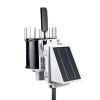Spectrum WatchDog 1000 Series Micro Stations
Features
- Internal sensors can include temperature and humidity
- Up to 4 external sensor ports
- LCD displays current sensor readings and battery level
- Free ground shipping
- Expedited repair and warranty service
- Lifetime technical support
- More
Overview
The Spectrum WatchDog 1000 Series Micro Stations are a cost-effective choice for recording environmental conditions over a period of time. The LCD display confirms station operation and provides current sensor readings. The stations are customizable with up to four unique external plug-in sensors. Change monitoring parameters from one season to the next, simply by connecting a different sensor. Options include a water-resistant Sliding Enclosure and a Waterproof Enclosure to protect the Micro Station from the elements.
Benefits
- Internal sensors can include temperature and humidity
- With up to 4 external sensor ports, you choose the sensors you need
- LCD displays current sensor readings and battery level
- Select measurement intervals from 1 to 60 minutes
- Log 10,584 intervals (220 days at 30-minute intervals), 8,064 intervals with virtual channels enabled (for SMEC 300)
- Data is stored in fail-safe non-volatile memory
- Water-resistant case
- 12-month battery life (CR2450, included)
- Transfer data with a direct-connect cable or Data Shuttle
- Requires SpecWare 9 Basic or Pro software
In The News
Source Water Monitoring in Albany, New York: Tracing Water Quality throughout Tributaries
Thousands of US cities pull their drinking water from natural source waters like reservoirs, rivers, and streams, making overall watershed health a key consideration for water providers. In Albany, New York, the Albany Department of Water and Water Supply delivers drinking water to over 100,000 residents as well as monitors and manages the larger drinking water supply watershed. Hannah Doherty, Environmental Specialist at the Albany Department of Water and Water Supply , spends her days working with a small team to monitor the drinking supply and the connected water bodies. Doherty explains, “We’re the first to encounter the water that ends up being the drinking water.
Read MoreWildfire Prevention in the Sierra Nevada Region with the Yuba Watershed Institute
Though recent wildfires have sparked new conversations about wildfire management and response, groups like the Yuba Watershed Institute have been monitoring the forests and water resources of the Sierra Nevada region for decades, managing approximately 5,000 acres of land with the Bureau of Land Management (BLM) and about 7,000 acres in private land partnerships. The goal of the Institute is to work with local communities and land agencies to improve watershed and forestry management through informed practices and public outreach. The goals of the Yuba Watershed Institute are three-fold: Improve the ability of fire suppression agencies like the California Department of Forestry and Fire Protection ( CAL FIRE ) and the US Forest Service.
Read MoreWave Sensors Integration with NexSens Buoys: A Cutting-Edge Solution for Wave Measurment
Real-time wave data supports accurate weather prediction, safe and efficient maritime operations, and provides valuable safety and operating condition information for recreation and commercial fishing. Understanding wave dynamics also helps with the design of protective coastal structures like seawalls, breakwaters, and jetties. It also supports better prediction of their impact on sediment transport and coastal geomorphology. Wave data is a key factor in qualifying and designing offshore wind farms and harnessing kinetic energy for electrical generation. It helps with the understanding of ocean-atmosphere interactions and contributes to studies of sea-level rise and climate change impacts.
Read More


































